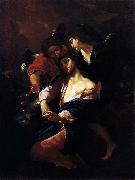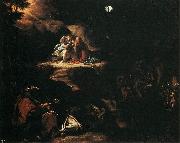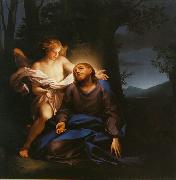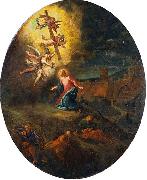Wholesale Oil Painting No Minimum |
|||||||||||
|
|
|||||||||||

|
|||||||||||
|
|
|
||||||||
|
|
||||||||
Christ in the Garden of Gethsemane
Christ in the Garden of Gethsemane Painting ID:: 68259 |
Technique Oil on canvas
Dimensions 99 ?? 75 cm
Technique Oil on canvas Dimensions 99 ?? 75 cm |
|||||||
|
|
||||||||
Orazio BorgianniItalian Baroque Era Painter, 1578-1616 |
||||||||
|
|
||||||||
|
|
Christ in the Garden of Gethsemane
Christ in the Garden of Gethsemane Painting ID:: 77968 |
Date ca. 1610(1610)
Medium Oil on panel
cyf Date ca. 1610(1610) Medium Oil on panel cyf |
||||||
|
|
||||||||
Anton Raphael Mengs1728-1779 Dutch Anton Raphael Mengs Gallery Mengs was born in 1728 at Usti nad Labem (German: Aussig) in Bohemia on 12 March 1728; he died in Rome 29 June 1779. His father, Ismael Mengs, a Danish painter, established himself finally at Dresden, whence in 1741 he took his son to Rome. In Rome, his fresco painting of Parnassus at Villa Albani gained him a reputation as a master painter. The appointment of Mengs in 1749 as first painter to Frederick Augustus, elector of Saxony did not prevent his spending much time in Rome, where he had married Margarita Quazzi who had sat for him as a model in 1748, and abjured the Protestant faith, and where he became in 1754 director of the Vatican school of painting, nor did this hinder him on two occasions from obeying the call of Charles III of Spain to Madrid. There Mengs produced some of his best work, and specially the ceiling of the banqueting-hall of the Royal Palace of Madrid, the subject of which was the Triumph of Trajan and the Temple of Glory. Among his pupils there was Agust??n Esteve. After the completion of this work in 1777, Mengs returned to Rome, and there he died, two years later, in poor circumstances, leaving twenty children, seven of whom were pensioned by the king of Spain. His portraits and autoportraits recall an attention to detail and insight, often lost from the grand manner paintings. Besides numerous paintings in the Madrid gallery, the Ascension and St Joseph at Dresden, Perseus and Andromeda at Saint Petersburg, and the ceiling of the Villa Albani must be mentioned among his chief works. In 1911, Henry George Percy, 7th Duke of Northumberland, possessed a Holy Family, and the colleges of All Souls and Magdalen, at Oxford, possessed altar-pieces by Mengs's hand. In his writings, in Spanish, Italian and German, Mengs has put forth his eclectic theory of art, which treats of perfection as attainable by a well-schemed combination of diverse excellences Greek design, with the expression of Raphael, the chiaroscuro of Correggio, and the colour of Titian. He would have fancied himself the first neoclassicist, while in fact he may be the last flicker of Baroque art. Or in the words of Wittkower, In the last analysis, he is as much an end as a beginning. His intimacy with Johann Joachim Winckelmann, who constantly wrote at his dictation, has enhanced his historical importance, for he formed no scholars, and the critic must now concur in Goethe's judgment of Mengs in Winckelmann und sein Jahrhundert; he must deplore that so much learning should have been allied to a total want of initiative and poverty of invention, and embodied with a strained and artificial mannerism. Mengs was famous for his rivalry with the contemporary Italian painter Pompeo Batoni. |
||||||||
|
|
||||||||
|
|
Christ in the Garden of Gethsemane
Christ in the Garden of Gethsemane Painting ID:: 90905 |
Oil on canvas, 185 x 185 cm.
Date ca. 1780
cjr Oil on canvas, 185 x 185 cm. Date ca. 1780 cjr |
||||||
|
|
||||||||
Gaspare Diziani(1689 - 17 August 1767) was an Italian painter of the late-Baroque or Roccoco period, active mainly in the Veneto but also in Dresden and Munich. His earliest training was in his native town of Belluno with Antonio Lazzarini, then moved to Venice, to the studio of Gregorio Lazzarini and later that of Sebastiano Ricci. He was seven years older, but otherwise his career was contemporary with the Lazzarini and Ricci fellow-pupil, Giovanni Battista Tiepolo. Between 1710-1720, he painted a group of eight pictures that included the Mary Magdalene for the church of San Stefano in Belluno, and Entry into Jerusalem for San Teodoro in Venice. He also painted three frescoes on the Life of Saint Helena in the Scuola del Vin next to the church of San Silvestro. Dizianies celerity and technical assurance are evident preparatory oil sketches, with color applied in rapid and spirited strokes. He was also working as a scenery painter for the theater and opera in Venice, Munich (1717), and later in Dresden, working with Alessandro Mauro. Diziani was invited to Rome by Cardinal Ottoboni in 1726, to paint a emagnificent decoration for the church of San Lorenzo in Damaso. The decoration is now known only through an engraving by Claude Vasconi. The Sala dei Pastelli in Ca' Rezzonico has an sotto in su allegorical ceiling fresco presenting Triumph of Poetry (Poetry surrounded by Painting, Architecture, Music and Sculpture). |
||||||||
|
|
||||||||
|
|
Christ in the Garden of Gethsemane
Christ in the Garden of Gethsemane Painting ID:: 98432 |
between 1745(1745) and 1750(1750)
Medium oil on canvas
Dimensions Height: 100 cm (39.4 in). Width: 82 cm (32.3 in).
between 1745(1745) and 1750(1750) Medium oil on canvas Dimensions Height: 100 cm (39.4 in). Width: 82 cm (32.3 in). |
||||||
|
|
||||||||
|
Gaspare Diziani (1689 - 17 August 1767) was an Italian painter of the late-Baroque or Roccoco period, active mainly in the Veneto but also in Dresden and Munich. His earliest training was in his native town of Belluno with Antonio Lazzarini, then moved to Venice, to the studio of Gregorio Lazzarini and later that of Sebastiano Ricci. He was seven years older, but otherwise his career was contemporary with the Lazzarini and Ricci fellow-pupil, Giovanni Battista Tiepolo. Between 1710-1720, he painted a group of eight pictures that included the Mary Magdalene for the church of San Stefano in Belluno, and Entry into Jerusalem for San Teodoro in Venice. He also painted three frescoes on the Life of Saint Helena in the Scuola del Vin next to the church of San Silvestro. Dizianies celerity and technical assurance are evident preparatory oil sketches, with color applied in rapid and spirited strokes. He was also working as a scenery painter for the theater and opera in Venice, Munich (1717), and later in Dresden, working with Alessandro Mauro. Diziani was invited to Rome by Cardinal Ottoboni in 1726, to paint a emagnificent decoration for the church of San Lorenzo in Damaso. The decoration is now known only through an engraving by Claude Vasconi. The Sala dei Pastelli in Ca' Rezzonico has an sotto in su allegorical ceiling fresco presenting Triumph of Poetry (Poetry surrounded by Painting, Architecture, Music and Sculpture). Christ in the Garden of Gethsemane between 1745(1745) and 1750(1750) Medium oil on canvas Dimensions Height: 100 cm (39.4 in). Width: 82 cm (32.3 in). |
||||||||
|
|
||||||||
|
Prev Next
|
||||||||
|
|
||||||||
|
Related Paintings to Gaspare Diziani :. |
||||||||
|
|
||||||||
|
CONTACT US |




